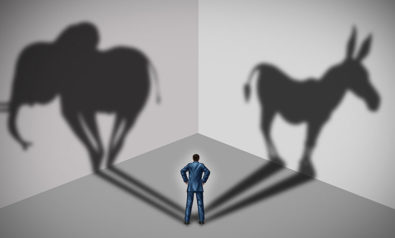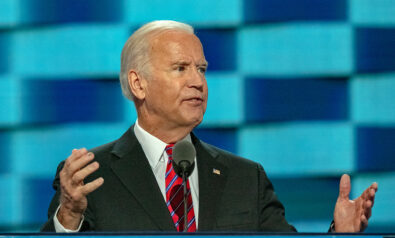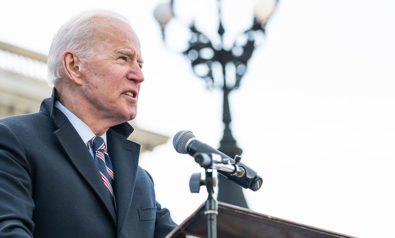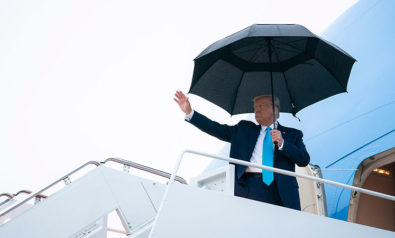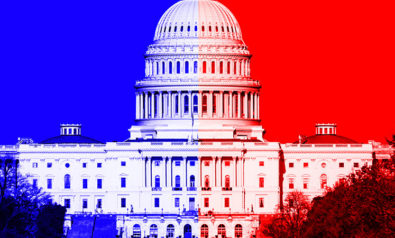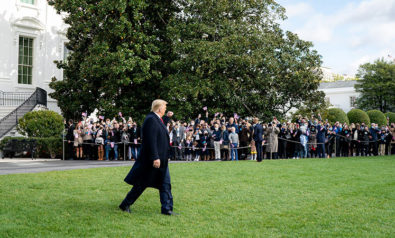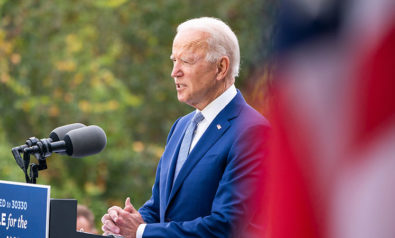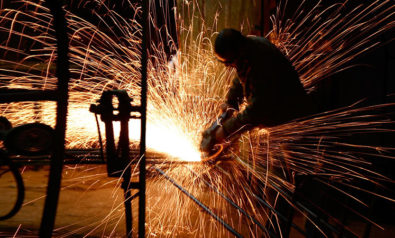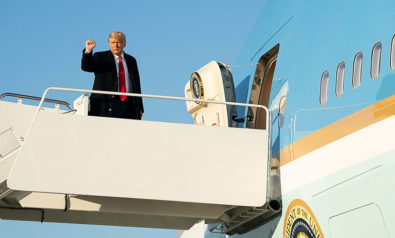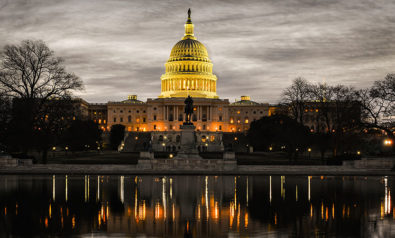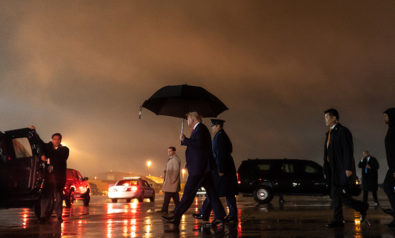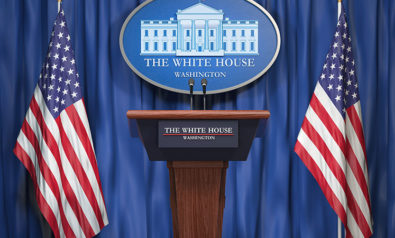Abraham Lincoln is generally credited with a famous adage that you can fool all the people part of the time, or you can fool some people all the time, but you cannot fool all people all the time. Until today, it is unclear whether or not Lincoln ever uttered the phrase. In the end, it is irrelevant, except for history buffs. I’m certainly not one of them. I love the saying because it expresses a deeper truth that once again has proven its power to get right to the point — much to the chagrin of Donald Trump.
360˚ Context: The 2020 US Election Explained
Throughout his tenure in office, President Donald Trump has mastered the art of hoodwinking and fooling his supporters, mesmerized by his larger-than-life ego, his sloganeering, his ability to promote himself as “one of them,” as the chosen one who would make America great again. Of course, he wasn’t, and he didn’t. And he could have cared less about all these voters who fell for him. And fall they did, and hard.
Ultimate Populist
Four years ago, Donald Trump presented himself as the ultimate populist, as the one candidate who listened, who understood, who felt “your pain.” The tragedy is, of course, that those who fell for him did so because they actually did feel pain. A lot of it. Their pain was real, and still is, perhaps even more so than four years ago. It is easy to dismiss Trump’s 2016 supporters as misguided hoopleheads, ignorant and unsophisticated. This is what Hillary Clinton did at the time, and she paid dearly for it.
There is a kernel of truth to the disparaging notion of the East Coast elites who are largely clueless with regard to the rest of the country. Otherwise how to explain the wave of journalists from The New York Times, The Boston Globe and The Washington Post rushing to obscure places in flyover country in a quest to find out how “these people” ticked. There is also more than a kernel of truth to the charge that the liberal elite has nothing but disdain if not outright contempt for “ordinary people” and a complete disinterest in their daily struggles to make ends meet. Unfortunately enough, today more than ever over the past few decades, the United States abounds in those who are in this predicament. According to official estimates, already in 2017, more than 50% percent of Americans did not have enough cash to cover a $500 unexpected expense. Amid the COVID-19 pandemic, things have hardly improved.
Trump won in 2016 because he managed to eke out a tiny advantage in critial swing states. Among the most prominent of these were Ohio and Pennsylvania. Once in the heartland of American industrial might, both states were devastated by deindustrialization. Documentary filmmaker Michael Moore confronted the American public with the heart-wrenching story of Flint, Michigan, once a major hub of the American automotive industry.
Flint, however, was only one of many stories of the collapse of the American Dream, the end of an era where Americans still were the most prosperous people on the planet, where anyone who managed to expertly wield a screwdriver could aspire to a middle-class life with a housewife, two children and two cars. As it turned out, Flint was paradigmatic of what had happened throughout the Midwest, from northern Indiana to Ohio to western Pennsylvania.
American liberals are quite inconsiderate. They have come up with a number of denigrating notions, such as “flyover country” for the vast swath of land between the two coasts. For the states devastated by deindustrialization, the moniker is “Rust Belt.” Pennsylvania, Ohio, Michigan — all of them are part of the Rust Belt — remnants of a bygone era, mired in nostalgia for a time when work in the steel mills was “recognized as challenging, dangerous, and important.” These were the days when cities, such as Youngstown, Ohio, Flint, Michigan, and Scranton, Pennsylvania, still counted for something, unlike today.
Failed to Deliver
Trump may lose tomorrow’s election because he fundamentally swindled his Rust Belt voters, much as he did his coal constituency. In both cases, he promised at the time of his election in 2016 that he would revive ailing industries. He failed to deliver on both counts. Steel and car manufacturing have not come back to the upper Midwest, and coal has virtually collapsed in crucial mining states such as West Virginia.
To be sure, this was inevitable, given international competitive pressures engendered by globalization. Only, during his 2016 campaign, Trump chose a rhetoric of resentment instead of telling it “as it is.” Among other things, he blamed deindustrialization and massive job losses on unfair competition from low-wage emerging and developing countries that “enriched” themselves “while leaving the United States littered with abandoned factories and underemployed workers.”
Not surprisingly, Trump’s rhetoric found open ears and minds among working-class communities in the Midwest hit hard by offshoring and deindustrialization. And for good reasons: Ordinary people could care less about the dynamics of international commodity markets, the profit margins of large corporations, shareholder value or the pressures exerted by financial markets. What they care about is primarily their ability to put food on the table, their concern that their children will lead a better life, and their concrete worries about the future. What they care about is that good-paying jobs return to their communities. This is what Trump promised in 2016. This is what he failed to deliver.
Trump’s working-class constituency should have taken notice as early as 2017 when the president sought “job-creation advice” from the leaders of corporations that were shedding thousands of workers as they moved production abroad to Mexico, India, China and elsewhere. In fact, as a recent Public Citizen’s Global Trade Watch report revealed, during Trump’s nearly four-year tenure, more than 200,000 workers lost their jobs as a result of corporate offshoring. Altogether, more than 300,000 jobs were lost to trade during his presidency.
To add insult to injury, about “one of every four taxpayers’ dollars spent by the federal government on procurement contracts during the Trump administration went to the pockets of companies that offshored American jobs during his administration.” In fact, half of the top 10 recipients of public contracts were companies that were offshoring jobs during Trump’s tenure.” Trump also did little to dissuade corporations from continuing to close down factories in the American “heartland.”
Decline
Take the case of Youngstown, Ohio, one of Trump’s campaign hotspots in 2016 and one of those industrial cities where many former Democrats switched to Donald Trump. Once a flourishing industrial city, by the turn of the new century, it was little more than a shadow of its former self. Youngstown’s decline started in the late 1970s with the collapse of the steel industry. In the years that followed, the region lost more than 50,000 jobs. It never recovered. In the first decade of the 21st century, the region saw the largest population decline of any of the nation’s 100 largest metro areas. By 2018, it was among the fastest-shrinking cities in the United States.
In late 2018, General Motors (GM) announced it would shut down its plant in the region, leaving 1,500 workers without a job. This came in addition to some 3,000 workers that had been let go since 2017. In 2016, some 40% of unionized auto workers (UAW) had voted for Trump. Yet when UAW leaders appealed to Trump to save their plant, he did not respond. When he finally met with GM’s CEO, she noted that the only thing that concerned her was “shareholder value.” Shareholders appreciated her determination. In late 2018, the industry’s leading trade magazine named her, for the second time, “Industry Leader of the Year.” So much for Trump’s heartfelt concern for the plight of ordinary American workers.
And then there is coal. In 2017, a few days after taking office, Trump praised “beautiful clean coal” and viewed his administration was “going to put our miners back to work. Miners are going back to work. Miners are going back to work, folks. Sorry to tell you that, but they’re going back to work.” They didn’t. On the contrary, under Trump, the coal industry has virtually collapsed. By early 2020, not least as a result of the COVID-19 pandemic, there were “more job losses and mine closures in the coal industry than at any time since Dwight Eisenhower was president 60 years ago, and despite Donald Trump’s fervent promises to revive the coal sector.”
This has been good news for the environment, but bad news for coal miners. The reality is, coal is one of the most toxic and harmful sources of energy — nothing beautiful or clean about it. The burning of massive amounts of coal in Siberia some 250 million years ago caused the most extensive extinction of living species in our planet’s history, wiping out 96% of all marine species and around 70% of terrestrial vertebrates. Of course, coal miners in West Virginia, Kentucky, Arizona and elsewhere could care less what happened some 250 million years ago. What concerns them is the fact that over the past four years, the source of their livelihood has virtually disappeared under their feet, Trump’s assurances notwithstanding.
A Bad Deal
And yet, some voters in West Virginia, the Appalachian state hit particularly hard by the collapse of coal, still maintained their loyalty to a president who had made boisterous promises and delivered little, if not nothing. Attracted by his “America First” rhetoric and his stance on abortion, they continued to support Trump as “the only one standing in the way of the entire industry closing down.” At the same time, they seemed more intent on blaming their predicament on those liberals harping on about climate change than on embracing policy options propagating a reasonable alternative to coal.
One way Trump sought to make good on his promises is protectionism. By now, the story is familiar, particularly with respect to Trump’s trade war with China. Hardly surprising, the most important target of American protectionism was steel. By raising tariffs on steel — under the guise of security considerations — Trump intended to shield domestic producers against international competition and allow them to raise their prices. The policy was a great success. According to informed calculations, the tariff did raise the price of domestic steel considerably, boosting the earnings of the US steel industry and creating some 8,700 new jobs. At the same time, higher prices pushed up the costs for steel users by a whopping $5.6 billion. This meant that steel users had to “pay an extra $650,000 for each job created” in the steel industry. The art of the bad deal.
Trump promoted himself in 2016 as a savvy businessman with vast experience in the art of the deal. As it turned out, his deal-making skills were more hot air than reality. Esquire magazine explored the huge gap between claim and reality as early as mid-2018, suggesting that “maybe the president isn’t actually that good a negotiator and/or businessman.” There was “abundant evidence,” the article charged, “that Trump, the consummate tough guy, often comes off worse in negotiations because he doesn’t actually know any details about the issues at hand and actually does not like confrontations.”
The disastrous course of Trumpian brinkmanship in his confrontation with China was glaring proof of Trump’s ineptness — with dramatic consequences. One of the sectors affected by Trump’s tariffs on Chinese imports were health-related goods, comprising a quarter of all imported medical products. Trump slapped tariffs on nearly $5 billion of US medical imports from China. With the global supply of medical wares drying up at the beginning of the pandemic, the United States faced serious shortages of vital medical equipment at a time it needed it most, partially crippling the country’s ability to confront the pandemic.
To be sure, there are many reasons Donald Trump may lose the election. His letting down of his core constituencies in the Rust Belt is only one of many. At the moment, polling shows Trump’s challenger, former Vice President Joe Biden, leading in the critical Rust Belt states of Michigan, Pennsylvania and Wisconsin, with the two currently tied in Ohio. In-depth studies over the next few weeks and months will undoubtedly reveal whether Trump lost support among major constituencies that four years earlier had been seduced by his rhetoric and personal style. In the end, however, Lincoln’s purported phrase may once again prove its worth. After all, you can’t fool all people all of the time, not even all of your former supporters.
The views expressed in this article are the author’s own and do not necessarily reflect Fair Observer’s editorial policy.
Support Fair Observer
We rely on your support for our independence, diversity and quality.
For more than 10 years, Fair Observer has been free, fair and independent. No billionaire owns us, no advertisers control us. We are a reader-supported nonprofit. Unlike many other publications, we keep our content free for readers regardless of where they live or whether they can afford to pay. We have no paywalls and no ads.
In the post-truth era of fake news, echo chambers and filter bubbles, we publish a plurality of perspectives from around the world. Anyone can publish with us, but everyone goes through a rigorous editorial process. So, you get fact-checked, well-reasoned content instead of noise.
We publish 2,500+ voices from 90+ countries. We also conduct education and training programs
on subjects ranging from digital media and journalism to writing and critical thinking. This
doesn’t come cheap. Servers, editors, trainers and web developers cost
money.
Please consider supporting us on a regular basis as a recurring donor or a
sustaining member.
Will you support FO’s journalism?
We rely on your support for our independence, diversity and quality.




